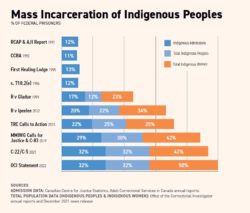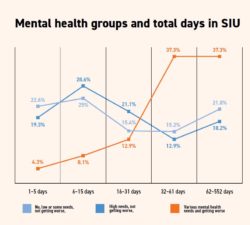Post #198
680 words; 3 minutes to read
This audio summary by volunteer Hannah Lee.
Last September we published a post on the report by the Senate of Canada Committee on human rights of prisoners in Canada. The Committee was highly critical of many aspects of the prisons system, calling for major changes that respected human rights of prisoners as recognized by the Supreme Court (R v Solosky, 1980). As the old adage has it, people are sent to prison ‘as’ punishment, not ‘for’ punishment.
Now comes another report, ‘Senators Go to Jail’, which describes what a group of Senators saw on their visits across the country in the last year or so to 11 federal prisons, for both men and women, as they looked at Bill C-83. This bill was the government’s legislative response to court decisions that required the elimination of solitary confinement. (Another post described the failure of the measures in Bill C-83 to make any notable difference in what happens to prisoners.)
Old problems made worse by Covid
The solitary confinement issue, and indeed prison conditions generally became much more problematic with Covid. Visits were suspended, programs stopped, and prisoners spent much more time in their cells. All prison conditions got significantly worse. But, as the report notes, even before ‘the onset of the COVID-19 pandemic, the flaws identified by the Senate were already blatantly evident.’
For example, the report shows graphically the steady increase in the proportion of Aboriginal prisoners.
A second chart shows how time in segregation is heavily concentrated among prisoners with serious mental health issues.
These are longstanding problems, noted many times in past reports on Canada’s prisons, with many promises from various governments to fix them. They are not fixed, but getting worse.
Prisons break the law
However the harshest criticisms in the report describe the failure of the prison system to abide by the law – even as the people in it are there because they did not abide by the law!
‘The Senators found that CSC practices often fail to comply with, much less uphold, the provisions of the Corrections and Conditional Release Act (CCRA) [which governs the operation of prisons in Canada]. Correctional realities also fail to adhere to international instruments that impact the human rights of prisoners, and contradict the principles and objectives of sentencing [as laid out in the Criminal Code].’
‘Too many of CSC’s practices violate the Canadian Charter of Rights and Freedoms and the principles of fundamental justice, while operating without the Rule of Law.’
It is startling for a Senate report on a major operation of the Government of Canada to conclude that thisgrievance system routinely violates Canadian law!
Prisoners have no recourse
The report also states that there is little prisoners can do when their rights are violated, in part because the grievance system just does not work. ‘Conditions of confinement did not meet legislative requirements. No prisoners, at any institution visited by Senators, reported having proper access to requests or grievances without the possibility of reprisal from prison.’
‘Prisoners at every institution Senators visited reported that the grievance system was dysfunctional and that CSC staff too often retaliated against those who tried to use it. This Senators’ visits revealed the failure of the government/CSC to comply with the Charter, the CCRA and its Regulations, not to mention the UN’s Minimum Rules for the Treatment of Prisoners. Particularly in light of the abject failure and inadequacy of Bill C-83, these injustices call attention to the need for legislative reform to the CCRA.’
Solitary confinement issues not resolved
Consistent with other reviews, ‘Senators discovered that there was no meaningful change within federal prisons after the enactment of Bill C-83. More specifically, the objectives of SIUs were not realized.’
‘Any changes to administrative segregation units were negligible, at best.’
The report concludes with this quote from Madame Justice Louis Arbour, from a 1996 inquiry into the state of our prisons, one of many that have produced similar findings.
“The Rule of Law is absent, although rules are everywhere.”
Back



Comments are closed here.